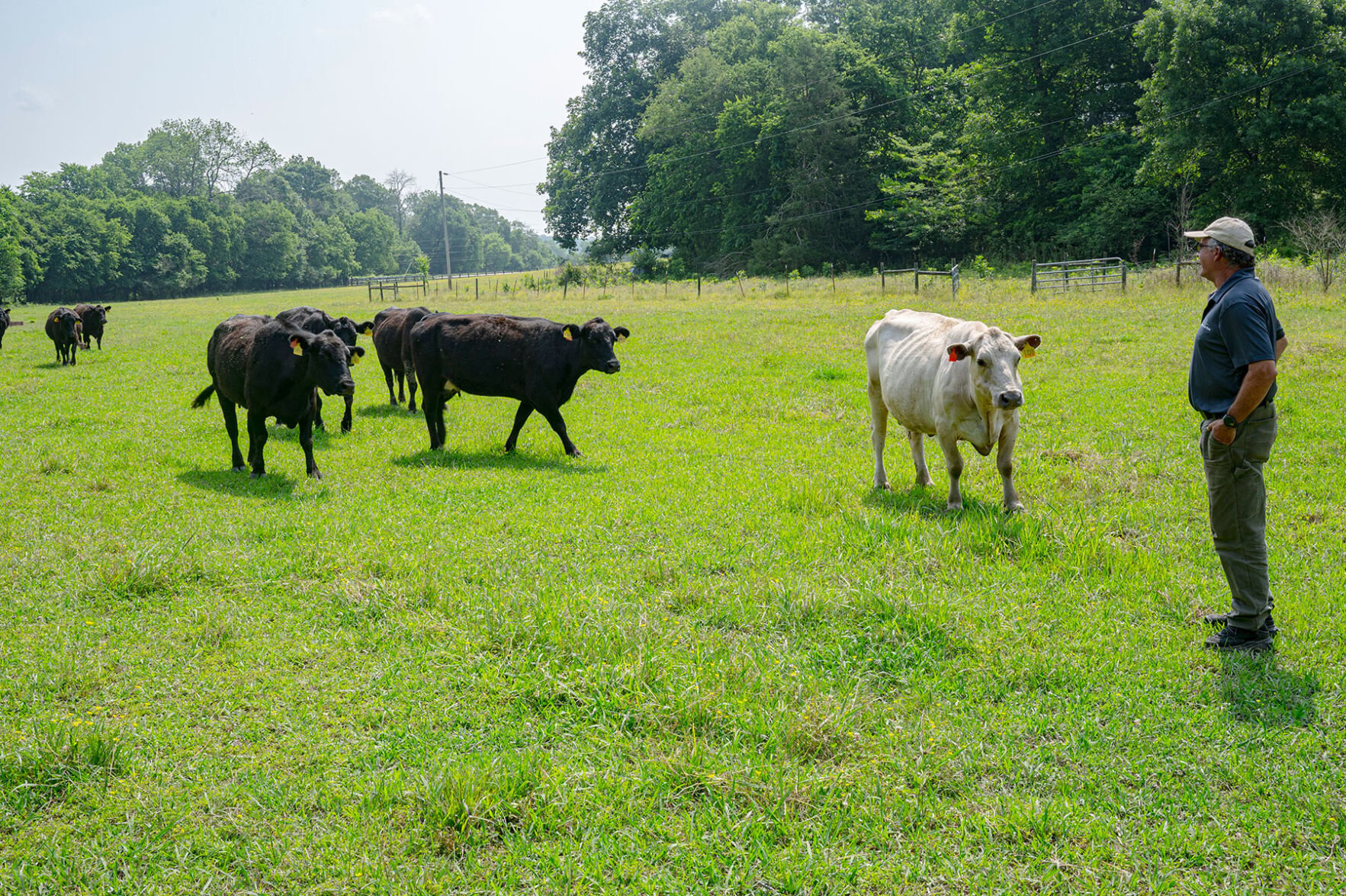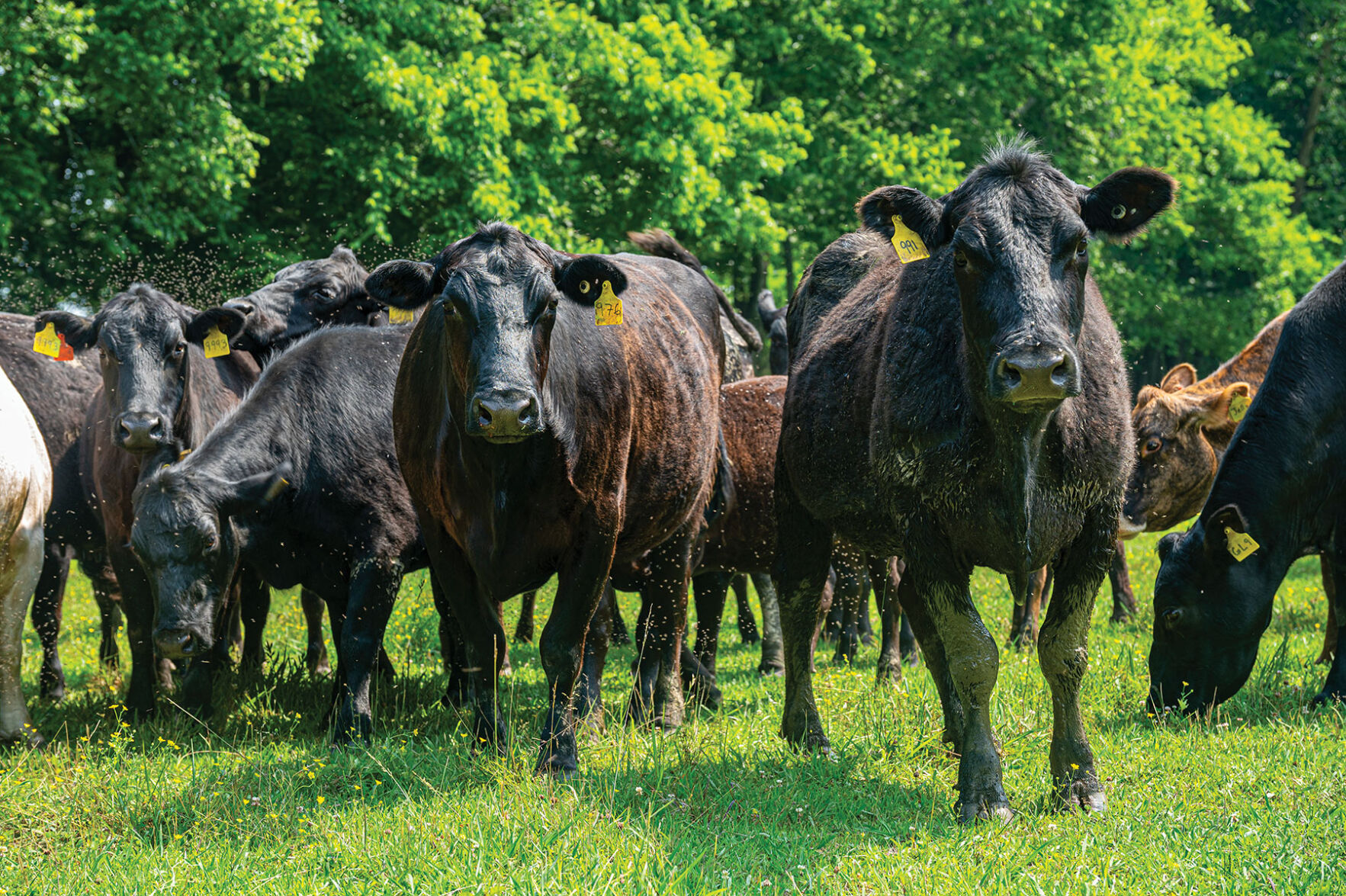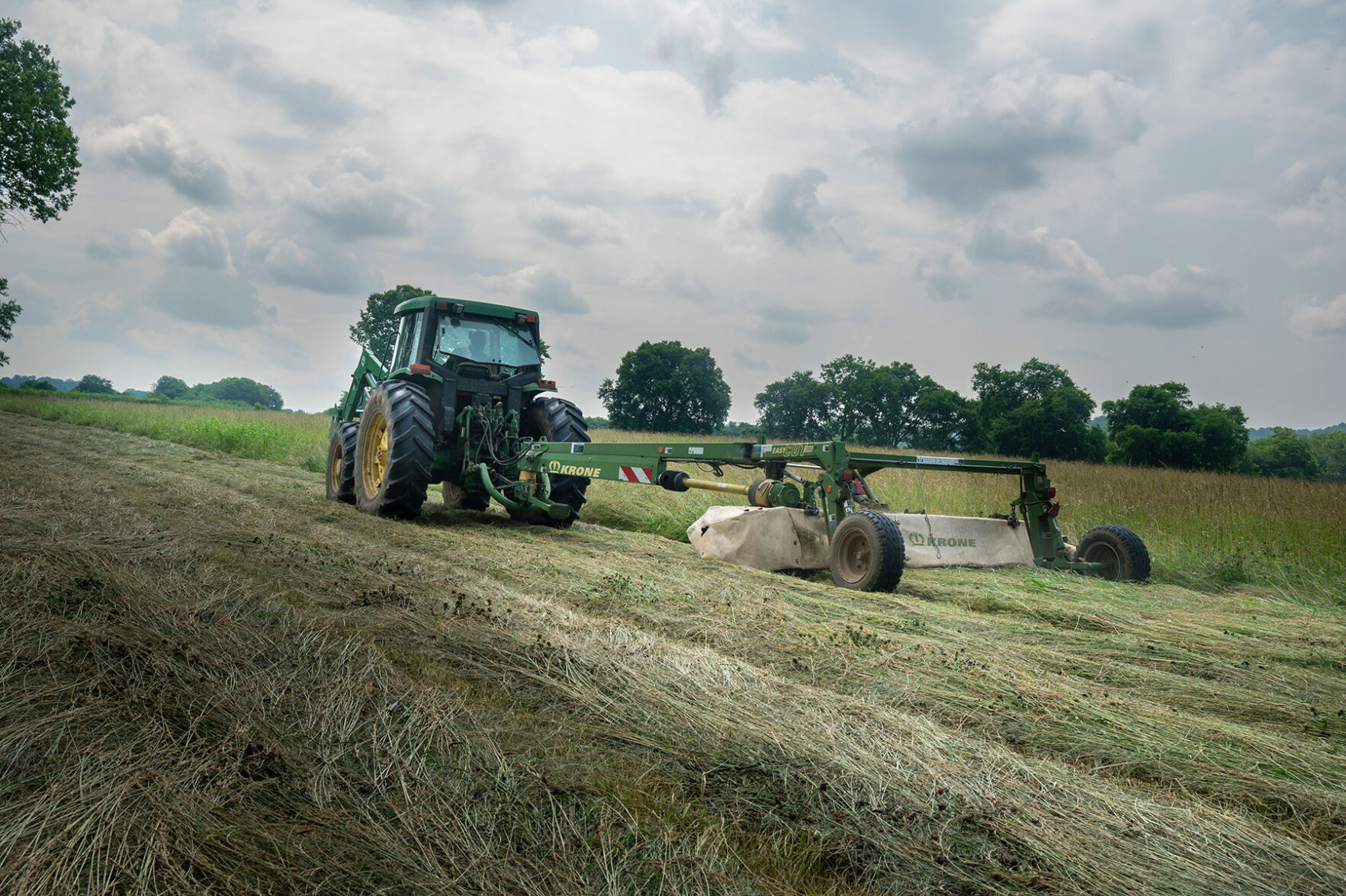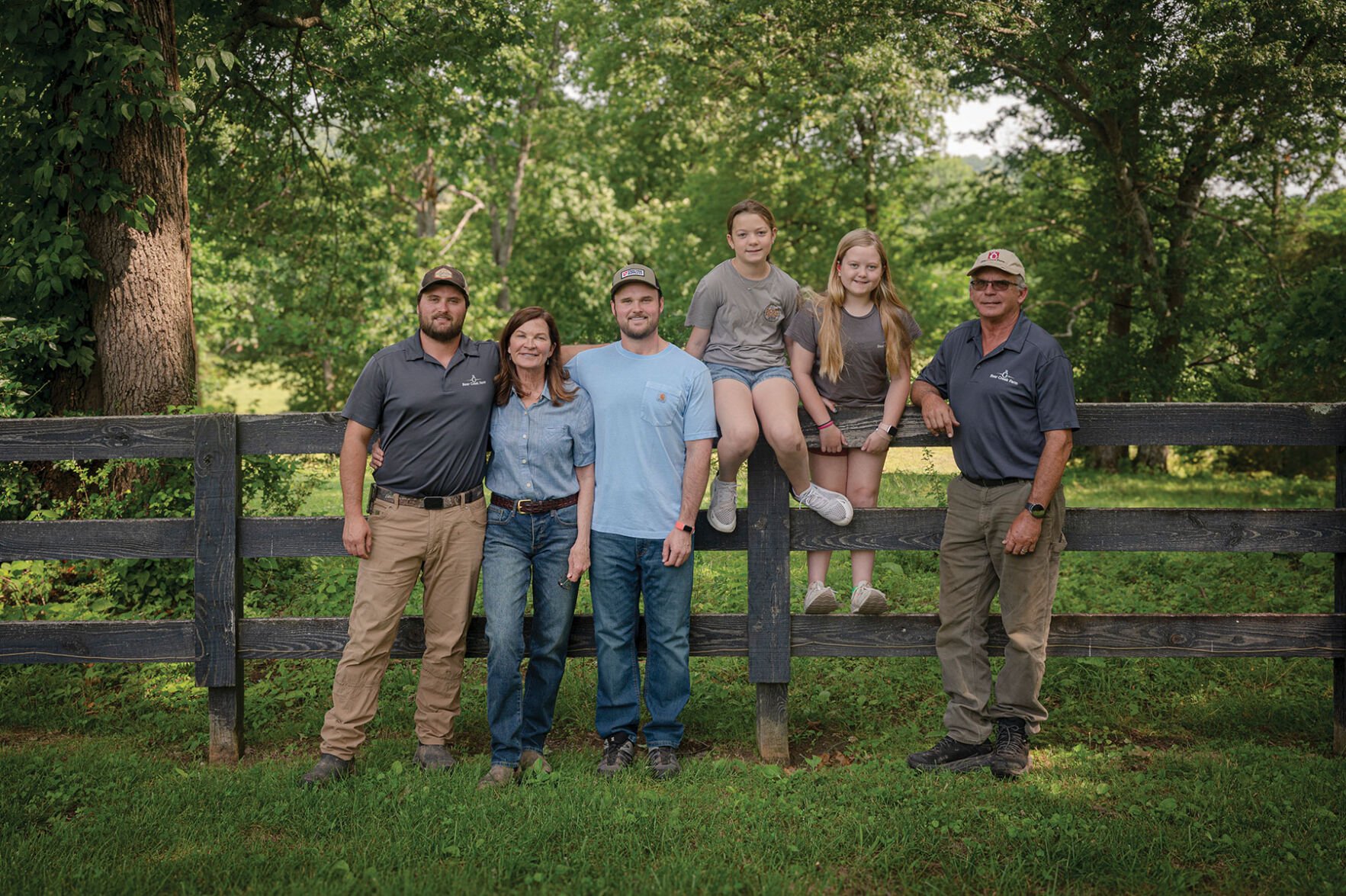When Eater unveiled its updated “Best Burgers in Nashville” list, a remarkable 25 percent of the featured establishments owed their standout beef to Bear Creek Farm in Thompson Station. This figure could have been even higher if owners LeeAnn and Bill Cherry were inclined — or able — to supply their beef to more of the city’s top burger spots.
In beef production, the goal is often to minimize ground meat sales in favor of higher-priced primal cuts like rib loins, strip loins and tenderloins. Consequently, the same cattle that provide exceptional ground beef for burgers at Grillshack, Redheaded Stranger, Brave Idiot and Joyland also show up on the menus of Nashville’s premier fine-dining restaurants.
Indeed, the all-natural, grass-fed and grain-finished Angus that yields a $190 ribeye at Husk might also be part of the meatloaf at Arnold’s Country Kitchen. “About 10 years ago, I started using their ground beef for meatloaf,” Arnold’s Kahlil Arnold recalls. “The meat I was getting from Sysco was like mush compared to the ground beef that I was getting from Bill and LeeAnn — freshly ground and full of fresh meat and fat. It was beautiful.”
The Cherrys strategically select their restaurant partners, meticulously balancing steak and ground meat sales by essentially pre-allocating parts of each animal. “If we can sell the 200 pounds of burger from a steer, we can harvest that steer,” says LeeAnn. “Then we have two more rib loins, two more strip loins and two more flats.” These prime cuts are integral to dishes at acclaimed eateries like Audrey, Pelican & Pig, Rolf and Daughters and Bad Idea. But Bear Creek meats also elevate everyday favorites, from the sausage gravy at Biscuit Love and the sausage, egg and cheese sandwich at Egghill to the chopped-steak sandwich at East Side Banh Mi and the Cobb salad at Radish.
What makes Bear Creek Farm’s meat so magical? The journey began in 2007, when a severe drought forced Bill Cherry to sell the herd he co-managed with his father. Rebuilding from this financial setback, he and LeeAnn committed to a more sustainable operation. They drilled wells to ensure a consistent freshwater supply across their 2,000-acre farm, where their cattle and hogs roam.

Bear Creek Farm
The cattle graze on rotated pastures or consume hay grown on site, guaranteeing a safe food supply controlled by the Cherrys; grain is introduced only in the final few months. A pivotal move came in 2012 when the Cherrys purchased their own USDA meat-processing facility in Chapel Hill, Tenn., ensuring humane and sanitary handling of the animals they painstakingly raised. “Some call it vertical integration, but my kids say that Mom is a control freak,” jokes LeeAnn.
Bear Creek Farm is a true family enterprise. The Cherrys’ daughter, Paige Alden, manages the Chapel Hill facility, while twin sons Alex and Grant McKenzie oversee farming and business operations. Family members have also pitched in with deliveries, staffed farmers market stalls and even cooked burgers at a Bonnaroo concession tent.
This hands-on philosophy extends from breeding to harvest. The processing facility features special pens, designed by a colleague of renowned animal welfare expert Temple Grandin, to ensure the most humane treatment during the animals’ final moments. This stress-free life and death minimizes cortisol release during harvest — cortisol is a steroid hormone that food scientists have found can negatively affect meat quality and tenderness.
“You have to understand the immense love and work invested over three years to bring a beef to that point,” says LeeAnn. “You must respect that and ensure a humane ending is done appropriately.”

Bear Creek Farm
Chef Colby Rasavong of Bad Idea attests to this dedication. “I’ve worked with Bill and LeeAnn since my early days at Husk, around 2013,” he says. “Their commitment to the highest quality over quantity is what draws many chefs like myself to their product.”
Bear Creek’s success is built on relationships — between the farmers and their land and animals, between ranchers and processors and between producers and chefs. Not just anyone can order from the Cherrys. LeeAnn seeks “care and respect all the way through, from the farm to the plate.”
The Cherrys often invite restaurant staff to the farm to witness the care provided to their herd of approximately 800 cattle. Understanding how coveted Bear Creek beef is, chefs become more flexible with their orders, recognizing they can’t always get specific cuts on demand.
“It’s about how we best utilize the animal,” LeeAnn says. “That’s the nature of our relationships. A chef might ask for strips. If we don’t have them, they might say, ‘You know, I’ll take flat iron, or I can make tri-tips.’ That’s how this can all work.”
Bryan Lee Weaver, chef-owner of Redheaded Stranger, gladly adapts to secure Bear Creek beef for his acclaimed Hatch chile burger. “I would rather remove an item from the menu than sacrifice the quality we get from LeeAnn and Bill,” says Weaver. “Knowing their meticulous process and that they have their own processing facility means a lot. I grapple with the ethics of using animals — and visiting the farm, learning their process and meeting their family and dogs helps to see the care they take in being responsible, amazing humans.”
While the Cherrys and their clientele would welcome expansion beyond their typical harvest of around 10 steers per week, they are committed to not overcrowding their pastures. The demand far outstrips current supply.
“We can’t keep up with all the new restaurants,” LeeAnn admits. “We only have so many animals. One of the biggest obstacles for farmers now is Tennessee’s rapid loss of farmland. We’re trying to acquire more land because that’s how we can grow. It’s very difficult for farmers in Middle Tennessee.”
Occasionally, Bear Creek can accommodate a new customer or offer a new cut, often when a restaurant changes a seasonal item or, regrettably, closes. This is how Chef Rasavong finally secured Bear Creek strip steak for Bad Idea.

Bear Creek Farm
“There’s only so much of each cow available weekly,” Rasavong says. “I never planned to serve a steak at Bad Idea because we never had access to primals like strip or rib loin. It didn’t make sense. But when LeeAnn told me strips became available, I jumped at the chance. It will never leave our menu while I’m in charge, because I wouldn’t know when they’d be available again if I gave them up!”
Beyond these intricate negotiations with restaurant partners, the Cherrys have cultivated other distribution channels. They sell directly to the public via their farm store, the Franklin Farmers Market and Green Door Gourmet. Nashville’s Bare Bones Butcher and Main Street Meats in Chattanooga purchase multiple whole animals at a time to break down for retail sale. Bare Bones also features Bear Creek beef in its renowned burger, and Main Street Meats owner Erik Niel showcases the Cherrys’ products at his restaurants Easy Bistro and Little Coyote in Chattanooga.
A partnership with Evans Meats and Seafood, a family-run business in Birmingham, Ala., has streamlined out-of-state deliveries, but the Cherrys still personally deliver to each Nashville customer. LeeAnn’s commitment to standards is such that she once had to “fire” a customer after an unsettling delivery experience.
“I walked into this one kitchen and had a bad feeling,” she says. “I knew immediately it wasn’t going to work. I wasn’t comfortable leaving the meat there; it felt like dropping your kid off at a day care you just don’t trust.”
At Bear Creek Farm, family, relationships and a profound respect for the animals guide the operation. The Cherrys set high standards for themselves and their customers. As chef Erik Niel aptly puts it, “Buying a pork rib loin from LeeAnn Cherry is harder than finding a bottle of Pappy Van Winkle!”
But for those who succeed, the result is unquestionably worth the effort.





